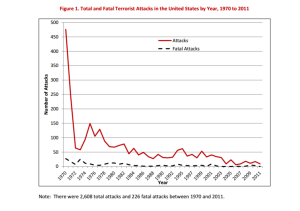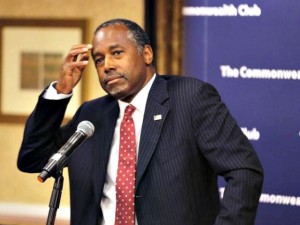Anti-Muslim rhetoric and Islamophobia are more prominent in American today than ever before. We live in a society in which a turban or headscarf has justify extensive TSA searches and a Muslim teenager with a clock could be a threat. And although this alone may not come as a surprise, it is when you compare the numbers today with those gathered in the months following 9/11.
In October 2001, a poll taken by ABC News and the Washington Post found that “47% of Americans had a favorable view of Islam.” While the percentage is less than half, it is not horrible considering the traumatic events of the previous month. The country was still in shock.
In 2014, thirteen years later, The Daily Beast reported that the statistic had dropped to “27 percent of Americans” having a favorable view of Islam. The decrease is tolerance and acceptance is curious because there had not been another attack of the magnitude of 9/11.
The chart below, published by the Washington Post shows the unmistakable decrease in terrorist attacks in the United States in the ten years following 9/11. It is clear that incidents of attacks from extremists steadily declined.

And yet, contrary to what one might think, there have been drastic increases in hate crimes and violent acts targeting Muslims in America. There is also an ignorant assumption that anyone wearing a turban is a Muslim and a terrorist. In reality, these fear-based assumptions are nothing more than that. So why has there been an increase in fear and anti-Islamic sentiment when there is not a corresponding threat?
The answer is as simple as it is scary: GOP Candidates. In an interview with the International Business Times, Mark Potok of the Southern Poverty Law Center said “a trend we are seeing is increased crimes directed at Muslims and increased hatred – that is very plain. It is very much in the public sphere where these things often originate. It is people like Ben Carson saying that a Muslim cannot be president. It is no surprise to see those things translate into criminal hate violence.”
He went on to say “[they] found very clearly over the years a connection between the kind of talk we are hearing from Carson and Trump and hate violence. What has really opened the spigot for anti-Muslim hatred are comments from politicians like this. These are men who give permission to Americans to viscerally hate Muslims and the entire religion of Islam. It is increasing fear in order to pander to the extreme elements of a political space and it is costing all of us, particularly the Muslim community in America.”
Realistically, this behavior leads to tragedies like the murders of Deah Barakat, Yusor Abu-Salha, and Razan Abu-Salha, last February at Chapel Hill.

(left to right) Deah Baraka, Yusor Baraka, Raza Mohammad Abu-Salha (watchingamerica.com)
This hasn’t always been the case of how the Republican Party or our government views or addresses Islam. Following 9/11, former president George W. Bush “made a number of statements disassociating Islam and the general Arab and Muslim population in America from Al-Qaeda. He also visited a mosque, a symbolic gesture that helped build a more positive image of Islam.”
So why and how did this shift take place in the Republican Party? What are the benefits of Muslim rhetoric for the presidential candidates?
Money.
In the twenty-four hours following Dr. Carson’s comments, his campaign received roughly 1 million dollars in donations. And yet, just a few days later, he shifted his perspective slightly, “saying he would support a Muslim president who swore to put the Constitution before religion and disavowed Sharia law.”
These politicians understand that their rhetoric carries weight. Regardless of whether or not they believe their own public statements is almost irrelevant because they are telling uninformed extremists what they want to hear. They are ultimately other-ing roughly 7 million of their fellow Americans for personal political gain. Universally, no good can come of this. Until we come together to talk about the real issues in our country rather than fabricated fears designed to divide us as people, we won’t progress as one people, rhetorically or otherwise.




